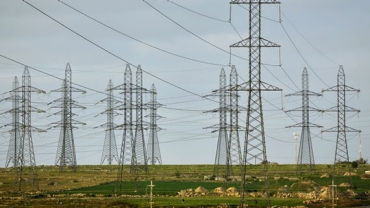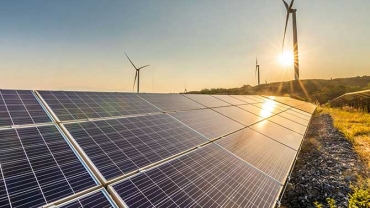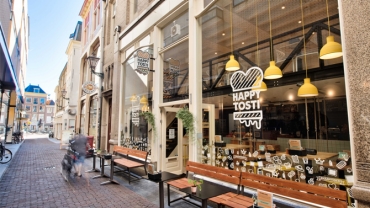
TenneT
For TenneT, the corona crisis is an exceptional time. Not only must the electricity transport system operator continue to guarantee secure supply via the high-voltage grid but it also has to consider its role as a driver of the energy transition. Manon van Beek (CEO) and Otto Jager (CFO) speak candidly about the impact of the corona crisis and the bottlenecks in the energy transition. “We give very clear direction, but we don’t set all the rules of the game.”
Privileged position
“As a company, TenneT’s in a privileged position”, Otto Jager observes. “Financially, the corona crisis is hardly affecting us. We have very creditworthy clients, no liquidity or revenue issues, and our projects are progressing well given the circumstances. When you compare that with what’s happening all around us – companies collapsing, insolvencies, people being laid off, airlines hardly flying any more – then I think it’s important that we at TenneT realise how well we’re holding up.”
But that doesn’t alter the fact that the situation at TenneT is very different at the moment. “Our people have been working from home as much as possible for several months now”, says Manon van Beek. “That’s going well, and it’s meant an enormous speed-up in homeworking and in digital support. I’m proud that we’ve made homeworking the norm within such a short time, just as I’m proud that our work out in the field has continued too.”
Critical infrastructure
“After all”, says Manon van Beek, “TenneT is critical infrastructure. We need to keep our people working so as to enable the energy transition. Needless to say, we make sure that they can carry out their work safely. Safety and dealing with crisis situations – whether that means terrorism, cyber threats, or in this case a virus – they’re part of TenneT’s DNA. We’ve had about thirty cases of coronary infection within the company, but fortunately they’ve all recovered. Our system operations department has kept the grid running perfectly and our repair service has been ready to operate 24/7. So we’ve been able to guarantee our service at all times. Our strategy has been to be extremely well prepared but at the same time not to overreact. We’ve repeatedly sought a balance between preparing really well but also constantly asking ourselves what actually makes sense.”
Demonstrating leadership
“It’s been an exceptional experience”, says Otto Jager. “You’ve got to figure out the way to go and learn while following it. There aren’t any books to tell you what to do: you have to think hard about it and decide together on how you can act as effectively as possible – as a father, as a family member, and as an Executive Board member. You have to deal with your own stress and fear as well as that of a large organisation. That means staying calm. The Board has to direct things, demonstrate leadership, and not shy away from tackling problems. Effective leadership eliminates stress and reassures people. We’re doing all that in a highly structured manner. So as to guarantee the continuity of our services, we discuss the current situation every morning at eight o’clock. The more that things are going well and are under control, the more the frequency of contact can be reduced and we can loosen the reins.”
Corona Plan Ahead Team
In addition to its crisis organisation and its business continuity team, TenneT now has a Corona Plan Ahead Team. That team looks ahead: three months, six months, one year, two years. Van Beek explains the approach: “Each week we deal with a particular topic, for example liquidity, incident management, system operations, or maintenance. On the one hand, it involves massive planning and thinking through and preparing ourselves properly for all kinds of different scenarios. On the other, it means trying to avoid overreacting and terminating projects too quickly.
What our employees appreciate – and they explicitly say so – is that there’s always a clear vision regarding our responsibility, for our people and for health, but also for the energy transition, and for the fact that we always want to continue with our work, doing so safely of course. That’s not as obvious as it sounds. In my weekly contacts with a number of CEOs of other TenneTs in southern Europe, I heard that 180 of the 200 projects at another company had been discontinued. In our industry, you can’t just stop a project, and certainly not just restart it. If you try to do that a few months later, you can hardly get the supply chain up and running again.”
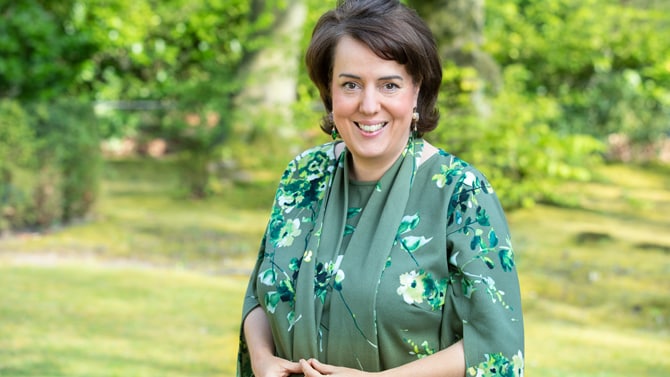
"In the coming years, that investment agenda will increase to four to five billion euros a year, with some ninety percent being directly related to sustainability."
The crisis encourages cooperation
Thanks to its corona team and scenario-oriented thinking, TenneT is thinking more and more in terms of end-to-end processes. Crisis situations often make clear what the interdependencies and weakest link(s) are in those processes. “That enables you to guide things even better so as to ultimately improve performance”, says Van Beek. “What we’ve learned is to give very clear direction, but not to determine all the rules ourselves. Our leadership team of 22 directors takes the freedom, but also the responsibility, to weigh up what makes sense. We’re an asset-driven company, but ultimately it’s our people who are the most important assets, not the billions on the balance sheet. Our purpose, promise, and principles increasingly position our people at the core of our business, and our suppliers too. During the crisis, we’ve told them: ‘Listen, it’s a difficult time. If you have a problem or an issue, let’s not write letters about it but come and talk to us and we’ll resolve it together.’ I hope this crisis will give a huge boost to cooperation, not just within our company, but also with our suppliers, stakeholders and partners, so that we all realise even more that our most important assets are ultimately our people.”
Green deal
Collaboration is also needed to achieve the goal of a climate-neutral society by 2050. The Green Deal that was on the table just before the Covid-19 outbreak started has been pushed into the background by the crisis. “But”, says Manon van Beek, “once we've emerged from the crisis, I foresee opportunities for us to play a really emphatic role in restarting or relaunching an ever-greener economy. TenneT’s investment record last year was 3.1 billion euros. In the coming years, that investment agenda will increase to four to five billion euros a year, with some ninety percent being directly related to sustainability. We’re a cross-border transport system operator (TSO) and we think and work beyond national borders, increasingly in integrated offshore and onshore.”
CO2 as the new yardstick
One of the aspects of the Green Deal is the positioning of CO2 as “the new currency”. It’s no longer euros but CO2 that’s the new yardstick. “That’s a nice way of putting it”, says Van Beek, “but how do you then prioritise projects and initiatives? Do some projects contribute more to CO2 reduction than others? And how do you quantify that? We do know what projects cost, when they need to be ready, and what bottlenecks we need to deal with. But in terms of CO2 impact we’re actually only at the beginning of how you measure it, let alone how you weigh it up and prioritise it. But I do think we can play an important role in that. We’ve in fact already started to think actively about an approach within Europe in cooperation with a number of other TSOs.”
European sustainable energy system
Close cooperation between TSOs, public authorities, and other relevant bodies – across borders – ought to be the rule rather than the exception, with a view to ultimately setting up a European sustainable energy system. “The Dutch and German governments are already explicitly taking joint action”, says Van Beek, “and we really do think we can set a good example for the energy transition in north-west Europe. A North Sea Energy System is also high on the agenda of EU Commissioner Frans Timmermans, and our North Sea Wind Power Hub is of course already a good example of the kind of initiatives that are possible. We need to look together at how to make the most of the potential offered by the North Sea. We also need to look at possible grid expansion and smart regulation, so that we can make good use of innovations and the flexibility available within the grid. With our cross-border blockchain platform – Equigy – households and owners of such things as electric cars or domestic batteries in the Netherlands, Germany, Switzerland, and Italy can actively offer the flexible capacity of their cars and batteries on the energy markets, on a large scale, so as to stabilise the electricity system.”
700 km of high voltage in the ground
One innovative, large-scale, and extremely challenging project is SuedLink. TenneT and fellow transport system operator TransnetBW are laying an entirely underground 700 km cable connection to transmit sustainably generated electricity from the north to the south of Germany. “It’s an incredible challenge”, says Otto Jager. “The amount of brainpower and manpower needed to get such a project going is enormous. We can’t do that on our own, so we came up with a concept to staff the project together with a number of leading parties, including PwC, and to set up the various functionalities. We’ve often worked with PwC already, but within SuedLink we’ve found that PwC makes a very valuable contribution through its knowledge and experience on the spot. Our long-standing relationship and mutual trust are essential in the context of such a large project. The complexity and scale of the energy transition can only be tackled if you utilise the collective mass of a broader playing field.”
“Ultimately”, Otto Jager adds, “our overall interest is a European sustainable energy system. To achieve that, you need to talk to all parties involved. The energy transition presents us with challenges. Greatly increasing volumes of renewable energy in new and unconventional locations means more transport over long distances. Germany, for example, is producing offshore wind energy far away from the major industries that use it. Our task is to dramatically increase transport capacity while at the same time keeping the energy transition affordable.
It’s also a challenge to keep the supply and demand for electricity in balance. After all, we won’t be able to switch gas-fired power stations on and off so easily in the future. I see it as our role to make things clear and discussable, so that you don’t just talk about the details while not discussing the bigger picture and the bigger interests, as well as one another’s interests (which are sometimes opposing interests). You have to have a genuinely honest discussion with one another, even when it’s about costs.”
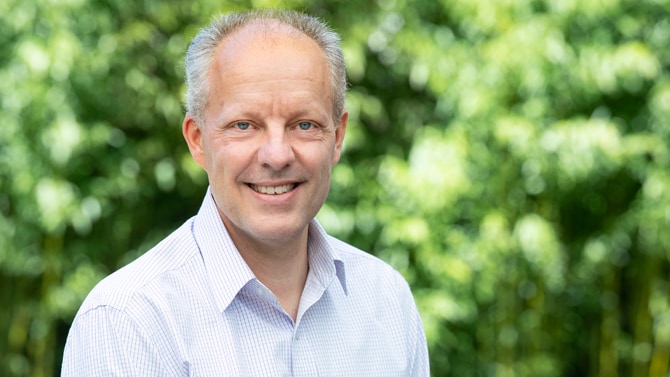
“Ultimately, our overall interest is a European sustainable energy system. To achieve that, you need to talk to all parties involved."
Financing the energy transition
As regards financing for the energy transition, Manon van Beek refers to the set of three-armed scales (in fact built by Otto Jager) in the boardroom at TenneT’s offices in Arnhem. “Those scales symbolise the essence of what we do and of what we can do more”, says Van Beek. “There are three pans that you have to balance up with one another: security of supply, sustainability, and affordability. That’s pretty complicated!”
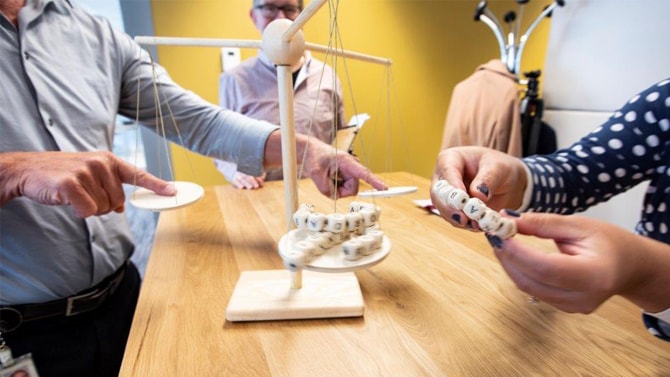
“Financing the energy transition is largely a question of risk sharing”, Otto Jager explains. “We’re in a special situation because 95 percent of our business is regulated. As long as it’s within that regulatory framework, we can assume that we will simply earn our returns and recoup our investment over a very long period of time – often forty years in the case of onshore. The dilemma for us is what is and isn’t covered by that regulation, now and in the future. Where do we potentially enter into competition with the market? On the other hand, if you leave it to the market and it’s too risky, then nothing will happen at all. So you can also think about promoting a number of new technologies – ideas regarding storage, for example – by a bit of facilitation within the regulation framework. Take hydrogen: it’s not currently commercially available. So you need to think about effective mechanisms: regulated business, subsidies, or some other incentive. Ultimately, it’s much more about risk reduction than money, because money is available. The question is: how do you ensure that there’s a framework within which society doesn’t pay for all the risks, while at the same time there’s more innovation within the system, thus further advancing the energy transition?”
Scope for experimenting
Manon van Beek comments: “Regulating or not regulating is one thing, but there’s of course also something in between. What you actually need is scope to experiment. It’s then the outcome of an experiment that determines whether you should regulate or in fact leave things to the market. If we plunge into the world of hydrogen, for example, we want to show that it works. People often think that hydrogen is nice, but that it’s not really going to help us. No, it won’t tomorrow, but if we want to be using it in ten years’ time, we’ll need to start today. Our challenge is to deal with today, tomorrow and the day after, but in TenneT terms tomorrow means 2030 and the day after means 2050. We in fact already know what we need to do over the next ten years – that’s a done deal to a certain extent. All we have to do is implement it. But you have to have an open and honest discussion about it, and balance it up again: what does it cost and can it be done? Because the problem with pilot projects at TenneT is that they don’t just cost ten thousand or a hundred thousand euros, but three zeros more than that. It would be nice to get the (temporary) scope for this, but that’s of course difficult because regulation is based on the past.”
Open and honest dialogue
TenneT is not convinced that the costs for the energy transition will stand in the way of achieving it. “Sure, it’s going to be expensive and one way or another it’s going to cost society a lot of money”, says Jager, “but you have to be open and honest about that and clarify it all. And you also have to dare to make political decisions about it. Will it be paid for through energy bills or through taxes? If you want to solve the problems of the next thirty to forty years, you need to make choices now. For politicians who want to be re-elected every four years, that’s sometimes difficult. Their horizon is often different to our long-range outlook. We note that as a TSO – with no commercial interest and no profit maximisation strategy – we play a more neutral role and therefore have a greater degree of credibility in the energy dialogue. We therefore see it as our company’s responsibility to contribute to that open and honest dialogue and to give it a positive twist.”
Contact us
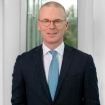
Energy - Utilities - Resources Industry Leader, PwC Netherlands
Tel: +31 (0)61 003 87 14











